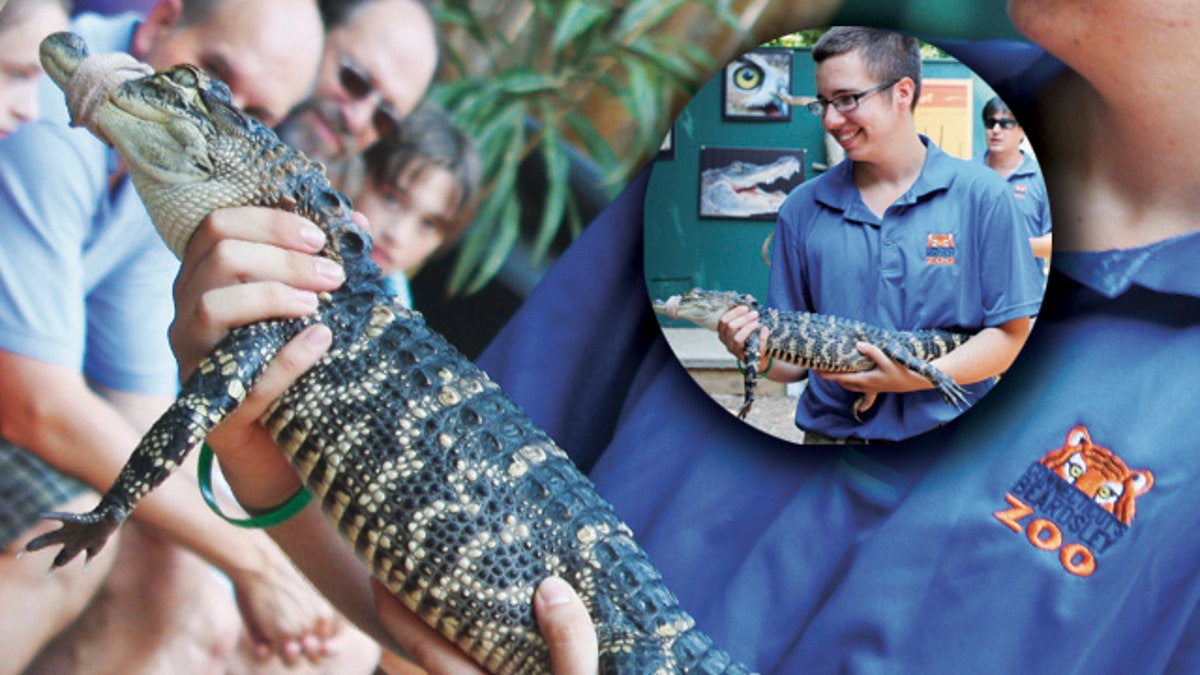
Beardsley Zoo's John Scott holds an American alligator. (Courtesy of Beardsley Zoo)
FAIRFIELD COUNTY, Conn. – If your Bengal tiger has outgrown your house, or you don't trust your pet cobra around kids, a zoo in Connecticut is offering a chance to turn your contraband critters over to people who know how to take care of them.
The acclaimed Beardsley Zoo in Bridgeport is holding a one day only "animal amnesty" on March 31, allowing owners of exotic -- and even illegal -- pets to unload them with no questions asked. The zoo held a similar event in 2009, taking in 135 animals, including ball pythons, rare birds and overgrown iguanas. But new regulations put in place after the pet chimp of a Stamford woman attacked a friend at the owner's home have reclassified ownership of certain animals as illegal.
"It raised the issue and it brings everything to light," Beardsley Zoo Deputy Director Don Goff said of the attack by a chimp named Travis on Charla Nash, who has since undergone extensive surgery and is still recovering. "A lot of people don't realize that people have exotics as pets."
Susan Frechette, deputy commissioner of the state Department of Energy and Environmental Protection, which is co-sponsoring the animal amnesty, echoed Goff, and said removing the fear of a fine or worse could avert future tragedies.
“We want to give people who own animals that are now illegal to possess, such as alligators and anacondas, the opportunity to surrender them without fear of penalty," said Susan Frechette, deputy commissioner of the state Department of Energy and Environmental Protection, which is co-sponsoring the animal amnesty.
Just last October, private ownership of dangerous animals made worldwide headlines when an Ohio man killed himself after setting free nearly 50 wild animals -- including 18 rare Bengal tigers and 17 lions. The event sparked a three-day big game hunt and a national debate on the wisdom of allowing people to keep potentially dangerous animals.
Beardsley Zoo, which is renowned for its big cats, expects to take in venomous snakes and possibly some alligators, Goff said. He said asking people to come forward with illegal or dangerous animals is preferable to sending the zoo's experts out to deal with crises.
“We’d just as soon it be a day and time where we are expecting them, rather than receiving a call saying there was an arrest and having to find a [place] for the animal,” said Goff, recalling an instance where the zoo's experts had to remove five alligators from a home.
Animal amnesty has been a hit in Florida, where Zoo Miami holds an annual event. The state has tried to stem the number of non-native species, especially pythons, that have been released by hapless owners into the Everglades, where they have caused widespread damage. Earlier this month, Zoo Miami took in 54 exotic animals, including tortoises, pythons and exotic birds. In the past, the Florida zoo has collected a coatimundi, a raccoon-like omnivore native to the southwestern U.S., a serval, an African cat that resembles a small leopard and several monitor lizards.
New laws in Connecticut have made owning alligators, crocodiles, smaller primates, elephants, kangaroos and dangerous snakes illegal for anyone except licensed parks or veterinarians who keep them for care or treatment.
In addition to facing possible charges, offenders caught with dangerous animals can also face paying for the cost of caring for animals once they are seized, said DEEP Sgt. Cynthia Schneider. Like Goff, she'd rather see people come forward than get caught.
But for March 31, she wants people to feel safe coming to turn in their animals anonymously.
“I just want people to take advantage of this opportunity,” Schneider said.
Residents can drop off exotic pets in secure carriers between 10 a.m. and 3 p.m., but no domestic pets will be accepted. For more information about Beardsley’s Amnesty Day, contact the Connecticut DEEP Environmental Conservation Police at 860-424-3012 or go to dep.enconpolice@ct.gov.

